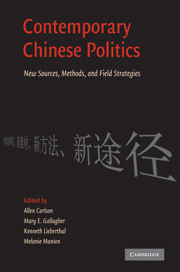Book contents
- Frontmatter
- Contents
- Tables and Figures
- Contributors
- Abbreviations
- Introduction
- Part I Sources
- 1 State-Generated Data and Contentious Politics in China
- 2 Why Archives?
- 3 The Central Committee, Past and Present
- 4 Experimental Methods and Psychological Measures in the Study of Chinese Foreign Policy
- 5 Internet Resources and the Study of Chinese Foreign Relations
- 6 Information Overload?
- Part II Qualitative Methods
- Part III Survey Methods
- Reflections on the Evolution of the China Field in Political Science
- Glossary
- References
- Index
2 - Why Archives?
Published online by Cambridge University Press: 05 June 2012
- Frontmatter
- Contents
- Tables and Figures
- Contributors
- Abbreviations
- Introduction
- Part I Sources
- 1 State-Generated Data and Contentious Politics in China
- 2 Why Archives?
- 3 The Central Committee, Past and Present
- 4 Experimental Methods and Psychological Measures in the Study of Chinese Foreign Policy
- 5 Internet Resources and the Study of Chinese Foreign Relations
- 6 Information Overload?
- Part II Qualitative Methods
- Part III Survey Methods
- Reflections on the Evolution of the China Field in Political Science
- Glossary
- References
- Index
Summary
Like many of the contributors to this volume, I began graduate school roughly a decade after China began its “reform and opening-up” process. At the time, the field of Chinese politics was, temporally speaking, reasonably well demarcated. Those of us in political science departments were expected to say something novel and significant about the post-1949 period. Within this rather narrow range, however, an even more contracted time span – post-1978 politics – drew the largest number of students, as well as generated the most interest among the broader public and departmental colleagues. To be sure, this temporal border was somewhat porous, but because it was also vigorously patrolled by tough-minded historians, who were reluctant to define the 1949–78 period as “history,” the “present-ism” in the study of Chinese politics was difficult to ignore. More recently, thanks to the growing interest in China’s “rise,” the gravitation of political science toward the present has become even stronger. Students of politics overwhelmingly concentrate on events in the last thirty years, whereas historians, with some exceptions, still focus on the pre-1949 period, leaving the other three decades of the People’s Republic of China (PRC) politics (1949–78) in a disciplinary twilight zone. In this chapter I suggest that presentism has not been cost-free in terms of our ability to understand Chinese politics and that these costs can best be recouped by broadening the temporal scope of Chinese politics and making archival research a far more integral part of scholarship than is currently the case.
These musings about disciplinary boundaries were stimulated by Roderick MacFarquhar and Michael Schoenhals’s study of the Cultural Revolution, Mao’s Last Revolution (2006). The book is exceptional in several respects. The authors collected fascinating data from a dizzying array of sources, among them Red Guard personal diaries, broadsheets, handbills, big-character posters, and minutes from Politburo meetings. It is difficult to imagine a more dogged pursuit of data on such a sensitive topic. Unsurprisingly, the book is jam-packed with politics (which they view as driven by personal and family agendas, with “institutions” and “organizations” playing bit roles). At the same time, Mao’s Last Revolution is atheoretical; I doubt it would pass muster as a “job talk” in most American political science departments, let alone provide the ballast to cross the tenure threshold. Last is the topic itself. Although some historians and sociologists and their graduate students have been encroaching upon the Cultural Revolution, it would be the intrepid graduate student in political science who would venture into the mid-1960s to pen a dissertation about civil-military relations in, say, Sichuan province. As if snubbing their noses at the fads and scientific pretensions of political science, MacFarquhar and Schoenhals present a balanced political history of those fateful years. The extended commentary on the credibility of sources, the discussion of how to weigh a particular piece of evidence, and their digging for valuable data nuggets would make both authors highly attractive candidates on the history job market!
- Type
- Chapter
- Information
- Contemporary Chinese PoliticsNew Sources, Methods, and Field Strategies, pp. 33 - 50Publisher: Cambridge University PressPrint publication year: 2010
- 3
- Cited by



